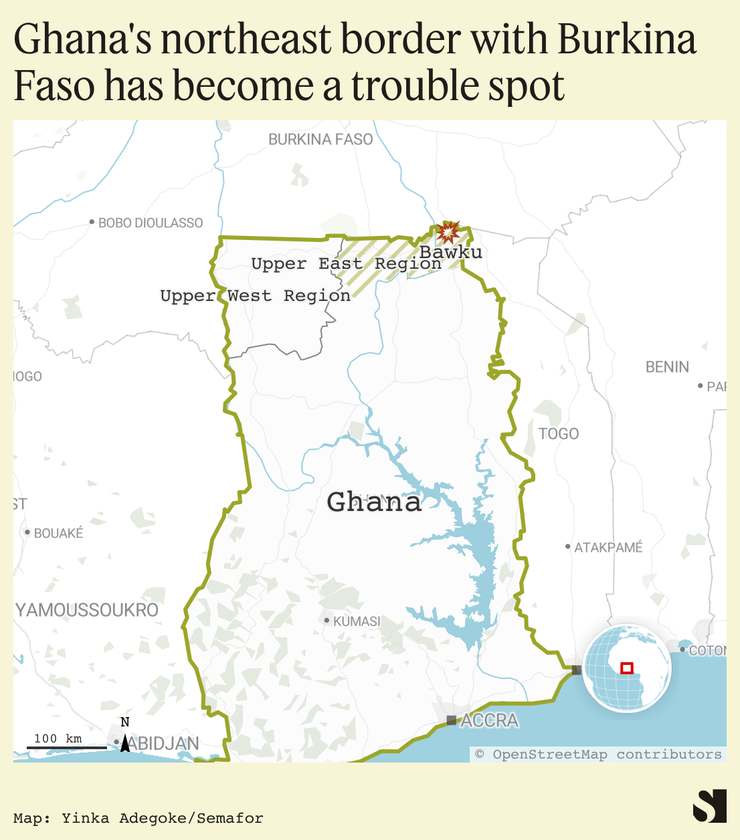The News
BAWKU, Ghana — Foreign fighters may have joined an escalating 40-year-old ethnic conflict near Ghana’s northern border with Burkina Faso.
Soldiers deployed in the Upper East Region of Ghana — where the troubled town of Bawku is located — on Monday (Feb.13) faced off with gunmen and killed six that police sources say they believe had been brought in from neighboring Burkina Faso, an hour’s drive away.
“The situation in Bawku is worrying,” the member of parliament for the area, Mahama Ayariga, told Semafor Africa. “We’re aware that it’s no longer the Kusasi and Mamprusi ethnic groups who are just fighting. From all indications, foreign elements are involved in the fight,” said Ayariga, who is from the opposition National Democratic Congress (NDC).
Successive governments have used soldiers to support local police in Bawku. On Monday, the defense minister more than doubled the number of troops deployed to the town by adding 500 soldiers to the 400 already stationed there.

In this article:
Kent’s view
Ghana has so far avoided the wave of Islamist violence that has destabilized neighboring countries in West Africa. But the situation in Bawku threatens to mark the point at which jihadists finally breached the borders of what has arguably been the region’s most stable country. If true, that would open a new front in conflicts waged by insurgents in the subregion and destabilize parts of northern Ghana.
Islamic State and al-Qaeda fighters have carried out hundreds of attacks in and around the Sahel in recent years that have killed thousands and forced millions to flee their homes. The resulting insecurity has led to coups in Mali and Burkina Faso in the last two years. Now locals I met say the jiadist-fueled insecurity is spilling over into Bawku.
Over 6,000 refugees fled south from Burkina Faso over the porous borders into Ghana, through Bawku, in the wake of attacks by jihadists in their country last year and the takeover of a military junta, the mayor of Bawku, Amadu Hamza, told me.
“We’re worried the jihadists will take advantage of the unemployment situation to radicalize the youth. The youth are vulnerable,” he said.
Locals have reported an influx of unfamiliar people in recent months.
“We sometimes see strangers with their faces covered loitering in the bushes and sometimes on motorbikes,” Abass Nurudeen, 50, a farmer, told me. The father of six said he had witnessed the deaths of five people in his community since December and wants to relocate with his family for their safety.
The two ethnic groups have been fighting sporadically since 1983, but locals say the ethnic conflict intensified last year after 13 years of relative peace. In the past six months, an estimated 200 people have died in the conflict, according to a local police chief speaking on condition of anonymity because they were not authorized to speak to the media on the sensitive subject.
Ghana’s defense minister, Dominic Nitiwul, told MPs last week that an improvised explosive device was used in an attempt to blow up a bridge in Bawku on Feb. 6, marking a serious escalation of violence.
“If we don’t treat the issue of Bawku as a special case it will lead to serious problems. That is how the issue of Nigeria started,” Nitiwul said, referring to Boko Haram’s more than decade-long Islamist insurgency in northeast Nigeria. “We risk the situation where Ghana can be thrown under terrorist attacks,” he said.
Mutaru Mumuni Muqthar, executive director of West Africa Center for Counter-Extremism said over militarization of the issue in Bawku is counterproductive.
“The government must engage the feuding factions and find lasting solutions to the conflict. We are not against the use of the military to restore peace, but that should not be the sole focus,” Muqthar told Semafor Africa.
He said the use of excessive force to quell the crisis would lead to “the failure we are now witnessing in the Sahel region in dealing with violent extremism.”
Room for Disagreement
The traditional ruler, Bawku Naba Asigri Abugrago Azoka II, whose legitimacy is being challenged as a result of the conflict, is optimistic that the insecurity situation in Bawku will not be worsened by jihadists.
“We are faced with dire situations like unemployment, porous borders, smuggling and human trafficking. But the structures we have in the various communities make it difficult for a foreigner to infiltrate that easily,” Azoka II told Semafor.
He said political instability in Burkina Faso puts a lot of pressure on the town to accommodate refugees, “but locals have always been on the alert to prompt the security anytime they suspect a foreigner is in the community.”
Notable
- Ghanaian authorities had already hinted at problems around the country’s northern border. In December, President Nana Akufo-Addo sought Washington’s support to ward off Russia-backed private security force Wagner Group which he said was operating around the with Burkina Faso. Accra later backed away from the claim. Ouagadougou’s military junta has since ordered French troops to leave.


